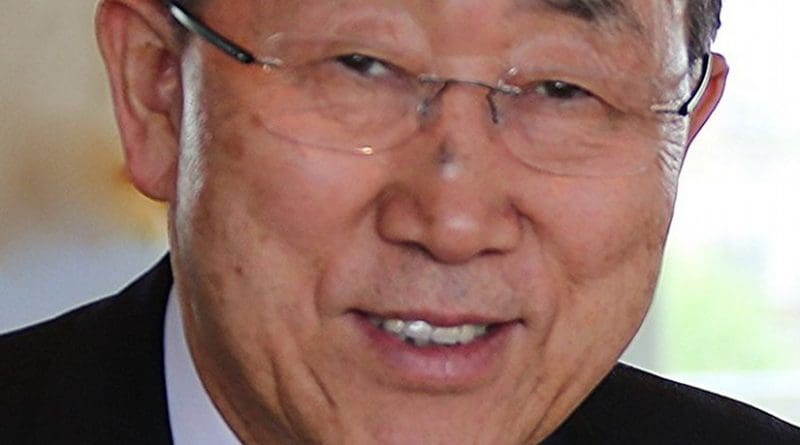Istanbul Summit To Find Ways Out Of Humanitarian Crises – Analysis
By IDN
By Ramesh Jaura
It is an open secret that UN Secretary-General Ban Ki-moon has put his heart into the first-ever World Humanitarian Summit set for May 23 and 24 in Istanbul, the most populous city in Turkey and the country’s economic, cultural, and historic hub.
If successful, the Summit would go down in history as his lasting legacy. Because it symbolizes a cupola supported by four columns: the Sendai Framework for Disaster Risk Reduction, Addis Ababa Action Agenda (AAAA), 2030 Agenda for Sustainable Development and the Paris Climate Agreement.
The crux of Ban’s message since September 2015, when world leaders endorsed 17 Sustainable Development Goals with 169 targets: “I call upon global leaders to place humanity – the concern for the dignity, safety and well-being of our citizens – at the forefront of all policies, strategies and decision-making. The World Humanitarian Summit must be for the people living on the frontline of humanity. They count on us. We cannot let them down.”
Indeed. Because humanity is confronting some of the greatest challenges of our time. In 2015, 125 million people were in need of humanitarian assistance. 60 million were forced from their homes. 37 countries were affected. An estimated US$20 billion were needed.
Ban explained the significance of the Summit in detail in his opening remarks at launch of Report for World Humanitarian Summit ‘One Humanity, Shared Responsibility’ on February 9, 2016 at the UN Headquarters in New York.
“We face profound, urgent and growing global challenges . . . Brutal and seemingly intractable conflicts are devastating the lives of millions and destabilizing entire regions. Violent extremism, terrorism and transnational crime are creating persistent instability,” he told member states.
“The widening gap between rich and poor is marginalizing and alienating the most vulnerable in society. Climate change is having a profound impact with increasingly frequent and intense storms, floods and droughts. Levels of need are at record levels, but the political solutions to relieve them are elusive. Today’s complex challenges cross borders and surpass the capacity of any single country or institution to cope,” Ban added.
Against this backdrop, he declared: “We need to restore trust in our global world order and in the capacities of our national and regional institutions to confront these challenges effectively. We need to show the millions of people living in conflict – with chronic needs and constant fear – the solidarity that they deserve and expect.”
The urgency of these challenges and the scale of the suffering mean that the international community must accept its shared responsibilities and act decisively, with compassion and resolve.
“The World Humanitarian Summit is the moment for us to come together to renew our commitment to humanity and the unity and cooperation required to prevent and end crisis and reduce people suffering and vulnerability,” he declared.
The UN Secretary-General’s Agenda for Humanity calls on global leaders to commit to five core responsibilities in the name of our shared humanity.
CORE RESPONSIBILITY 1 – Global leadership to prevent and end conflict: Preventing conflicts and finding political solutions to resolve them is our first and foremost responsibility to humanity. Because conflicts drive 80% of all humanitarian needs.
CORE RESPONSIBILITY 2 – Uphold the norms that safeguard humanity: Every day, civilians are deliberately or indiscriminately killed in wars. We are witnessing the erosion of 150 years of international humanitarian law. But even wars have limits: leaders must recommit to upholding the rules that protect humanity. Because 90% of people killed or injured by the use of explosive weapons in populated areas are civilians.
CORE RESPONSIBILITY 3 – Leave no one behind: The World Humanitarian Summit is the first test of our commitment to transform the lives of those most at risk of being left behind.
This means reaching everyone and empowering all women, men, girls and boys to be agents of positive transformation. It means reducing displacement, supporting refugees and migrants, ending gaps in education and fighting to eradicate sexual and gender-based violence.
CORE RESPONSIBILITY 4 – Change people’s lives – from delivering aid to ending need: Success must now be measured by how people’s vulnerability and risk are reduced, not by how needs are met year after year.
Ending need will require three fundamental shifts in the way we work: Reinforce, don’t replace national systems; Anticipate, do not wait for crises; Transcend the humanitarian-development divide. This is particularly important considering that today, 43% of people live in fragile situations. By 2030 that number is estimated to climb to 62%.
CORE RESPONSIBILITY 5 – Invest in humanity: Accepting and acting upon our shared responsibilities for humanity requires political, institutional and financial investment.
As a shift is needed from funding to financing that invests in local capacities, is risk-informed, invests in fragile situations and incentivizes collective outcomes. We must also reduce the funding gap for humanitarian needs. In 2014, only 0.4% of official development assistance was spent on disaster preparedness.

